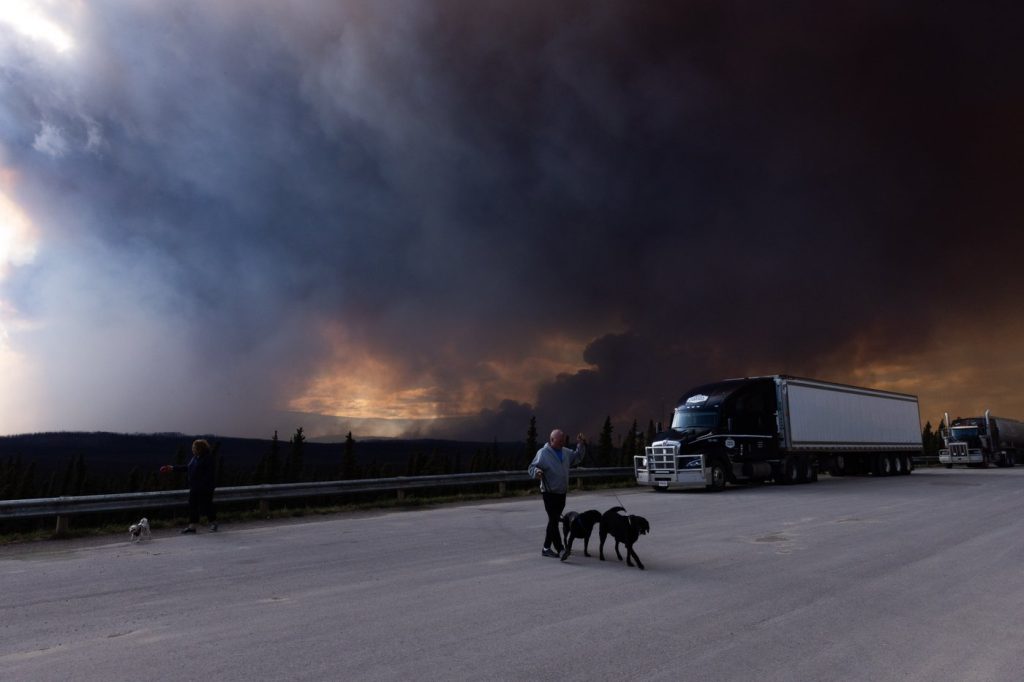Two recent studies are providing valuable insights into the impact of climate change on mental health in Canada. A national study published today reveals that approximately 2.3 percent of Canadians experience climate change anxiety at a level deemed "clinically relevant," leading to significant distress and disruption in their daily lives. This severe manifestation of climate anxiety is notably more prevalent among individuals who have directly faced the consequences of climate change, women compared to men, those living in Northern Canada versus Southern Canada, younger generations in contrast to older generations, urban residents compared to rural inhabitants, and individuals with lower income levels.
The study, featured in the academic journal Nature Mental Health, indicates that Indigenous peoples show the highest prevalence of severe climate anxiety, reaching nearly 10 percent. This statistic may reflect the disproportionate effects of climate change, such as wildfires, diminished sea ice, and warmer winters, on Indigenous communities, as well as the significance of the relationship between human and planetary health emphasized in Indigenous worldviews.
A separate peer-reviewed study, published late last month, highlights that 37 percent of Canadian teenagers surveyed feel that climate change is impacting their mental well-being. Climate change, primarily driven by emissions from burning fossil fuels, has tangible repercussions on Canada’s health, contributing to worsening air quality due to escalating wildfires and the spread of disease-carrying insects that thrive in milder winters and longer summers.
However, the mental health ramifications of climate change may be underestimated in Canada. A report from 2022, prepared for the Public Health Agency of Canada, warned that this underestimation could lead to public health services being unprepared and understaffed to tackle the issue at hand. Climate anxiety forms part of this broader concern, characterized by the heightened distress individuals feel regarding the impending threats posed by climate change. Such fears can stem from personal experiences with extreme weather events or constant exposure to climate-related messaging.
While experiencing worry or fear about climate change is not intrinsically problematic—and may even be a healthy reaction prompting proactive measures for solutions—severe instances of climate anxiety can disrupt daily routines and exhibit symptoms akin to generalized anxiety disorder, including obsessive thoughts, feelings of dread, inability to focus, and nightmares. To assess the prevalence of this severe climate anxiety across Canada, the research team surveyed 2,476 participants nationwide, using a series of questions adapted from a widely recognized climate anxiety scale. Respondents reflected on how often thoughts concerning climate change might disrupt their sleep or concentration, prompted them to question their reactions to climate change, and adversely affected their daily lives.
A symptom was classified as clinically meaningful if an individual reported that their anxiety-related thoughts or feelings about climate change disrupted their routine at least occasionally. While only 2.3 percent of the respondents exhibited a severe form of climate anxiety, around 15 percent reported experiencing at least one symptom. The researchers, including experts from the University of Alberta and Acadia University, noted that climate change anxiety appears to be less prevalent in Canada than in several other nations, suggesting a potential underreporting of the condition. For instance, previous studies have identified a 9.4 percent prevalence in Australia, 3.6 percent in the United Kingdom, and 11.6 percent among French-speaking populations in Europe and Africa.
The study authors highlighted challenges in comparing such international studies, raising a fundamental question: when do concerns over climate change transition into what can be classified as climate change anxiety? They referenced recent Australian research indicating that the threshold commonly used to identify climate anxiety in their study might be set too high, suggesting that "clinical distress" may occur at lower levels than previously believed. Consequently, they cautioned that their findings might underestimate the prevalence and severity of clinically relevant climate change anxiety in Canada.
Meanwhile, the authors conducting the study on teen mental health employed a different methodology. Their survey engaged over 800 Canadian adolescents aged 13 to 18, asking whether they believe climate change is affecting their mental health. Among those who responded affirmatively, approximately one-quarter reported a significant impact on their mental health, while others noted a minor effect. The anonymous nature of the survey allowed teens to express their feelings in an open-ended format. Many expressed feelings of uncertainty about the future and concerns about parenthood as environmental conditions deteriorate. Others articulated anxiety linked to wildfire seasons or sadness stemming from perceived inaction among influential individuals.
An 18-year-old girl from New Brunswick articulated her feelings about the situation, stating it saddened her to realize that "big corporations that produce loads of carbon dioxide would rather have a lot of money than a healthy planet."











